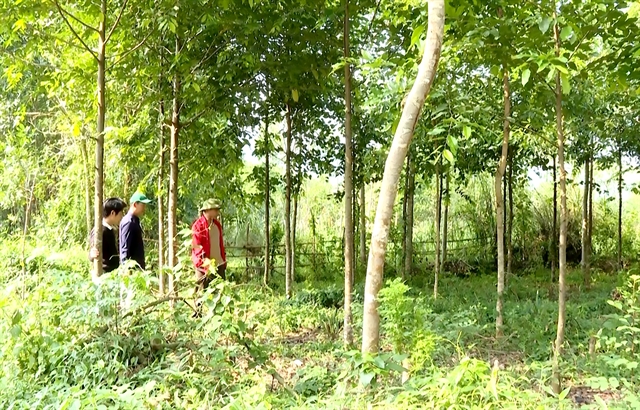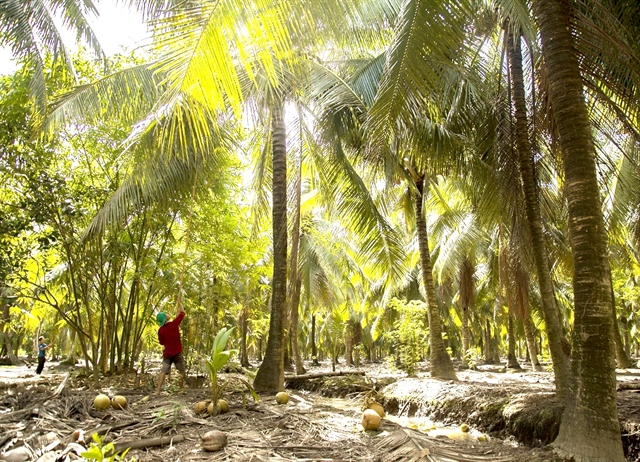 Environment
Environment

 |
| Local people in a forest in the coastal central province of Quảng Bình.—VNA/VNS Photo |
HÀ NỘI — Localities across the country are undertaking activities to develop the carbon credit market.
The development of the carbon credit market is considered a concrete step towards policies on reducing greenhouse gas emissions, allocating emission quotas, carbon credit trading and creating green financial resources for Việt Nam.
Nguyễn Văn Duẩn, deputy director of the Quảng Bình Province’s Forest Protection Department, said that besides leveraging the strengths of natural forests, the province would expand its scope, evaluate eligible areas and estimate the potential for reducing greenhouse gas emissions by implementing new forest planting activities according to international standards, converting small wood plantations to larger ones to increase forest carbon reserves in the future.
The province would also hold meetings with relevant organisations and individuals to consult on the assessment results and propose activities to develop forest carbon credit projects, he said.
The province currently has over 590,000ha of forest, including over 469,000ha of natural forest. The forest coverage rate reaches 68.7 per cent and the forest quality is relatively good.
During the 2023-25 period, the province received VNĐ235 billion (US$9.25 million) from carbon credit sales, thereby providing income for nearly 11,000 forest owners, contributing to sustainable forest management and protection.
Meanwhile, HCM City has been selected as the first locality to pilot the carbon credit trading mechanism.
Specifically, the city will implement potential projects to generate carbon credits, such as upgrading street lights to LED, installing rooftop solar systems for public and private assets in the area, and equipping buildings with energy-saving devices.
Under this plan, the city’s Department of Natural Resources and Environment will collaborate with the city's Department of Finance to finalise the pilot project on the financial mechanism to implement measures for reducing greenhouse gas emissions through carbon credit trading and offsetting mechanisms, submitting it to the People's Committee of the city for approval.
Additionally, they will coordinate with the Ministry of Industry and Trade, Ministry of Transport, Ministry of Agriculture and Rural Development, and Ministry of Natural Resources and Environment to determine the contribution ratio for greenhouse gas emission reduction and absorption within the city's area towards the national greenhouse gas emission reduction target before engaging in carbon credit trading.
In the Mekong Delta province of Bến Tre, it currently boasts the largest coconut plantation area in the country, covering approximately 78,000ha.
According to researchers, with the area, the province has the potential to store between 1.9 - 5.8 million tonnes of CO2 (excluding crops under coconut trees).
Recognising the agriculture sector's significant potential to participate in the carbon credit market, as well as move towards a green and circular economy, the provincial agriculture sector has been focusing on continuing to develop eco-friendly agriculture, circular economy, low-carbon emissions, environment-friendly and climate-resilient agriculture.
The provincial Department of Agriculture and Rural Development has collaborated with the provincial Department of Natural Resources and Environment and relevant agencies to assess the province's potential participation in the carbon market.
 |
| A man harvests coconuts in a coconut plantation in Thới Thạnh Commune, Thạnh Phú District in the Mekong Delta province of Bến Tre. — VNA/VNS Photo Hồng Đạt |
Supporting policies
In order to establish mechanisms and policies for organisations and individuals to participate in the development of the carbon market; and address the import, export, consumption and handling of substances that deplete the ozone layer in accordance with international conventions that Việt Nam committed on January 7, 2022, the Government issued Decree 06/2022/NĐ-CP on mitigating greenhouse gas emissions and protecting the ozone layer.
However, to response to current situations, the draft decree proposes amending and supplementing certain provisions of Decree 06/2022/NĐ-CP, suggesting amendments to Article 17 regarding the development roadmap and the timing of launching the domestic carbon market.
Accordingly, by the end of 2027, the country has to build regulations for managing carbon credits, greenhouse gas emission quota exchange activities, and carbon credit exchange; operation regulations for the carbon exchange will be developed; pilot projects for carbon credit exchange mechanisms in potential sectors will be implemented; guidance for implementing domestic and international carbon credit exchange mechanisms consistent with Vietnamese laws and international agreements will be provided; and a pilot Carbon Exchange will be established and operated from 2025 onwards.
From 2028 to the end of 2030, official operation of the Carbon Exchange will commence in 2028; regulations for connecting and trading carbon credits domestically with regional and global carbon markets will be established; and financial products based on greenhouse gas emission quotas and carbon credits exchanged on the Carbon Exchange will be regulated.
In the post-2030 period, expansion of domestic carbon market participants; connection of domestic carbon markets with regional and global carbon markets will be implemented.
Carbon quota transfer, borrowing, repayment and offset activities will be conducted on the National Registration System.
The draft decree also proposes adding provisions on the responsibilities of relevant units in managing and operating a unified exchange consistent with the contents of the Carbon Market Development Project in Việt Nam.
The greenhouse gas emission quota traded on the Carbon Exchange will be matched and traded in accordance with the trading regulations of the competent securities exchange authority.
Carbon credits traded outside of buying and selling can be traded through negotiation but must be registered on the Carbon Exchange.
Guidance on buying and selling greenhouse gas emission quotas and carbon credits on the Carbon Exchange will be issued by the Minister of Finance.
Decree 06/2022/NĐ-CP currently does not regulate the issuance of approval letters for international carbon credit transfers.
Therefore, in the draft new decree, the environment ministry has proposed adding some regulations such as: the project management authority signs the Carbon Credit Purchase Agreement under the International Agreement Law, including content on the expected greenhouse gas emission reduction amount to be transferred.
The environment ministry is responsible for issuing approval letters for international carbon credit transfers based on proposals from the project management authority, the opinions of relevant management ministries, agencies, and the implementation status of the national greenhouse gas emission reduction targets. — VNS




